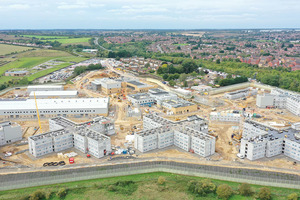New prisons go green
New prisons will be equally effective at cutting carbon emissions and crime, the Lord Chancellor Robert Buckland announced today (Friday 14 May).

- New jails to be ‘net zero’ in future
- Designs will stop 280,000 tonnes of CO2 and cut energy demand by half
- £100m expected cut in energy costs
As the Government works towards net-zero by 2050, the four new prisons being built in England will use heat pumps, efficient lighting systems and thousands of solar panels, to reduce energy demand by half and cut carbon emissions by at least 85% compared to prisons already under construction.
This is expected to reduce CO2 emissions by 280,000 tonnes, cut £100 million in energy costs over the next 60 years. Future prison expansions will also be built to similar standards.
The new designs will learn from the construction of HMP Five Wells in Wellingborough, Northamptonshire, and the new jail in Glen Parva, Leicestershire, which are being constructed more sustainably than existing prisons using recycled materials and incorporating green energy.
Lord Chancellor Robert Buckland said:
Our ambitious approach offers a unique opportunity to build back a safer and greener prison system.
New jails will use new green technologies and modern methods of construction to ensure our prisons cut carbon emissions as well as reoffending.
The four new prisons will use an all-electric design that eliminates the need for gas boilers, meaning they will produce net-zero emissions when the National Grid decarbonises. During construction, 40,000 tonnes of carbon will be prevented by using recycled concrete and steel.
Existing prisons are also benefiting from a £15 million investment to cut their emissions. Solar panels are being installed at a further 16 sites to meet 20% of their power demand - bringing the total number of solar panels across the estate to over 20,000. More than 200 electric vehicle charging points are also being installed across 40 prisons.
Habitats for wildlife will be cultivated at each prison to promote biodiversity and ensure the local ecology is stronger than before construction began.
The developments are part of the Government’s £4 billion programme to create 18,000 additional modern prison places that boost rehabilitation and cut reoffending.
The environmentally friendly drive accompanies wider government action to build back greener with more than £12 billion in green investment to help achieve its commitment to reach net zero by 2050. This will include hydrogen and carbon capture technology, greener homes, electric vehicle charging infrastructure, walking and cycling infrastructure, flood defences and backing offshore wind to power every UK home by 2030.
Notes to editors
- The first of the four new prisons will be built next to HMP Full Sutton in East Yorkshire and work is underway to investigate locations for a further prison in the North-West of England and two in the South-East.
- The MoJ is seeking to achieve the gold-standard ‘outstanding’ rating in Building Research Establishment Environmental Assessment Method (BREEAM) for its four new prisons. BREEAM is an independent scheme which assesses the sustainability of infrastructure projects.
- The UK is a global leader on tackling climate change which is why we’ve committed to reach net zero by 2050.
- The Prime Minister recently set out a Ten Point Plan help make the transition to a greener future.
- The Ten Point Plan for a Green Industrial Revolution sets out £12 billion in green investment, including for hydrogen and carbon capture technology, greener homes, electric vehicle charging infrastructure, walking and cycling infrastructure, flood defences and backing offshore wind to power every UK home by 2030.
- The UK was the first major economy to legislate to end our contribution to climate change by 2050, and we have committed to reducing greenhouse gas emissions by at least 68% compared to 1990 levels by 2030 - the highest reduction target by a major economy to date.
- Great Britain has made incredible progress to reduce our reliance on fossil fuels, including going over 5,000 hours without using coal for electricity during 2020. Over the last three decades, the UK has achieved record clean growth. Between 1990 and 2019, our economy has grown by 78% while our emissions have decreased by 44%, this is faster than any other G7 nation.